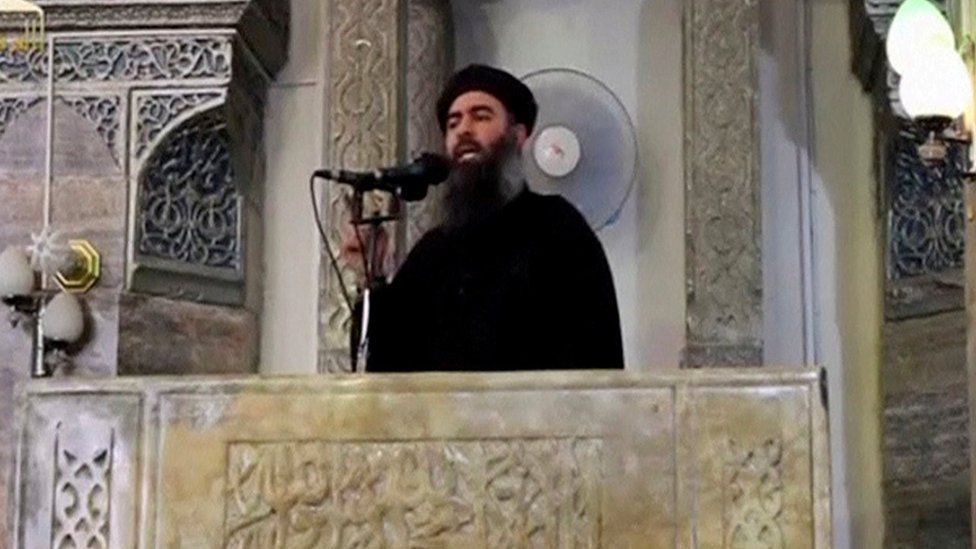Islamic State leader Baghdadi 'may have been killed by Russia'
- Published

Russia's defence ministry is investigating whether one of its air strikes in Syria killed the leader of the Islamic State militant group (IS).
The ministry said an air strike may have killed Abu Bakr al-Baghdadi and up to 330 other fighters on 28 May.
It said the raid had targeted a meeting of the IS military council in the group's de facto capital of Raqqa, in northern Syria.
There have been a number of previous reports of Baghdadi's death.
This is the first time, however, that Russia has said it may have killed the IS leader. Other media reports have previously claimed he had been killed or critically injured by US-led coalition air strikes.
Forces opposed to IS have been closing in on Raqqa in recent weeks.
Russia sent an air force contingent to Syria in September 2015 to shore up President Bashar al-Assad, bombing both IS and other rebel groups opposed to the government.
What are the Russians saying about the air strike?
Thirty IS field commanders and up to 300 fighters were at the meeting in a southern suburb of Raqqa, the defence ministry said on its Facebook page.
Baghdadi and the others had gathered to plan escape routes from the city, the ministry said.
The Russian air force launched an air strike between 00:35 and 00:45 local time (21:35 and 21:45 GMT 27 May), after notifying the US military in advance.
Su-35 and Su-34 jets were used in the strike, which was preceded by drone reconnaissance flights, the ministry said.
According to the Russian defence ministry, which published photos of the site targeted before and after, other IS figures killed in the strike include Emir of Raqqa Abu al-Haji al-Masri, Emir Ibrahim al-Naef al-Hajj and IS security chief Suleiman al-Sawah.
Russian Foreign Minister Sergei Lavrov told reporters he was still seeking the facts of what had happened, saying, "I do not have 100% confirmation of the information about the elimination of Abu Bakr al-Baghdadi."
Does the Russian account stack up?
Hours after the air strike, IS media released a video showing extensive damage to buildings and a number of dead people, mostly covered up, blaming "US air strikes".
The US-led coalition said on Friday it could not confirm whether Baghdadi had been killed.
There has been no official comment from Syria's government.
Tens of thousands have left Raqqa as fighting intensifies
Baghdadi's whereabouts have been unknown for some time, although he was believed to be in Mosul in Iraq before a US-led coalition began an effort to reclaim the city in October 2016.
He has made only one public appearance in recent years - in a video delivering a sermon in Mosul on 5 July 2014, shortly after IS captured the city.
His last audio message was released on 2 November last year.
Rami Abdulrahman, director of the Syrian Observatory for Human Rights monitoring group, was quoted by Reuters news agency as saying he had information that Baghdadi was in another part of Syria at the end of May and was not killed.
In March, US Secretary of State Rex Tillerson said that "nearly all" of Baghdadi's deputies had been killed.
Who is Baghdadi?
Baghdadi - a nom de guerre rather than his real name - is believed to have been born in Samarra, north of Baghdad, in 1971.
Reports suggest he was a cleric in a mosque in the city around the time of the US-led invasion in 2003.
Some believe he was already a militant jihadist during the rule of Saddam Hussein. Others suggest he was radicalised during the four years he was held at Camp Bucca, a US facility in southern Iraq where many al-Qaeda commanders were detained.
He emerged as the leader of al-Qaeda in Iraq, one of the groups that later became Islamic State of Iraq and the Levant (IS), in 2010.
In October 2011, the US officially designated Baghdadi as a terrorist. It has offered a reward of up to $25m (£19.6m) for information leading to his capture or death.
What does the online chatter say?
So far, there has been minimal reaction from online supporters of IS to news of the reported death of the group's leader, BBC Monitoring reports.
IS sympathisers typically ignore reports from unofficial IS sources or ridicule them, especially given that Baghdadi's death has been reported several times in the past.
A Raqqa resident describes daily life under so-called Islamic State.
One high-profile IS supporter on the messaging app Telegram shared a post denying the news and saying that when an IS leadership figure is killed, the group does not hide it.
IS normally does not rush to confirm the death of leadership figures, and would belatedly and sometimes indirectly announce them in general messages or by naming military campaigns after the deceased leader.
However, in the case of IS spokesman Abu-Muhammad al-Adnani, the group rushed to announce his death on 30 August 2016, the same day he was targeted in a US air strike in Syria, pre-empting any reports by the military or media.
- Published8 March 2016
- Published17 October 2017
- Published15 June 2017
- Published8 June 2017
- Published10 July 2017
- Published28 March 2018